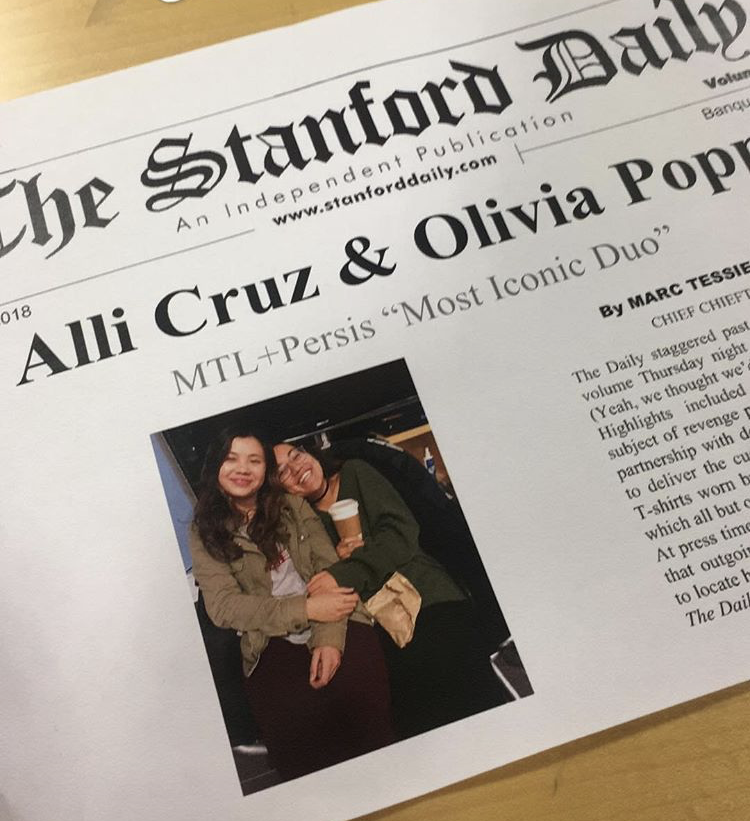The Daily has taken me innumerable places, both literally and metaphorically. In my very first assignment for The Daily, I set foot in the ritzy Fairmont San Francisco hotel to conduct my first interview — one-on-one, 15-minutes — with (Oscar-nominated!) actress Hailee Steinfeld for her film “The Edge of Seventeen.” Since then, I’ve interviewed a variety of incredible artists and creators, taken a multi-year grand tour of Bay Area theater; visited museums and attended conventions and seen shows in countless places; covered film festivals around the country (and the world — although I still dream of going to Cannes); and ended up on the Wikipedia page for the first installment in the truly inexplicable “Boss Baby” film franchise.
Yet despite all of this, I always return to that very first piece. All agog, I walked in to interview Steinfeld, someone a mere 18 months older than I am. This bizarrely intimate interview experience was also something I really never had again. (I still recall Steinfeld’s iPhone with a pink case sitting face down on the table as she sipped a cup of English breakfast tea.) After the interview, at the Caltrain station in San Francisco, I strangely grew emotional, having spent the interview asking someone else about their life and their interests and the path they saw for themselves. In my first quarter at Stanford, I asked myself what I was doing, where I was going, and most importantly, what I really wanted out of undergrad. Unfortunately, I had no clear answers.
I frequently say that I am fickle. I’ve always had an inordinate number of interests and move between them constantly — and perhaps you could call me indecisive. Yet in my Stanford application, I wrote about loyalty as something meaningful to me — a commitment to people and ideas that acted as a grounding point amidst a sea of swirling ideas. (When I was younger, a friend once joked that the reason I talked quickly was that my mouth was trying to catch up to all the thoughts in my head.) My time at Stanford has been marked by a struggle to figure out how to reconcile these two concepts. How do you commit when you’re decidedly noncommittal?

The answer to that emerged a few years into my Stanford career — I would commit to being noncommittal. I always worried that I would never find my way, that the mantra of “Oh, you’ll fall into a major” (or the more direct “You’ll figure out what you like most”) would never come true for me. And in many ways, it never did. I wavered and frantically moved between disciplinary areas until the very end — stepping into and stepping away, changing between majors and minors well into my final quarters. I learned that academia deeply frustrated me — that the institutional system in which I was initially so excited to learn was simultaneously the thing that was keeping me back from the fullest extent of my education.
I began asking myself who or what the construct of discrete disciplines is serving — the organization and consolidation of knowledge in different forms, a type of gatekeeping of what could be considered “true expertise” via the system of academia. Yet I often found myself most personally and academically fulfilled when I actively cross-pollinated between schools of thought — or even across extracurriculars and other experiences. For instance, at certain times, I could combine art and science and apply their multitudes of theoretical and practical approaches to each other in ways that transcended disciplinary conventions. However, at other times, I could also wholeheartedly enjoy them in separate spaces while considering them commensurable concepts. I didn’t always need to be multidisciplinary or interdisciplinary — perhaps I could even be postdisciplinary, or at least linger somewhere near it.
Maybe someone nobler than I would choose to go into academia in order to change academia. I, unfortunately, don’t think I am that person. However, I am glad I found others who supported me in this pursuit — that there were, and continue to be, others who saw this unwillingness to fit into a preformed disciplinary box. I find myself most grateful to them and not to the institutional systems that may have led us together but ultimately often acted more to restrict us than they allowed us the freedom to find these confluences.
However, there’s one problem I came in with that I still haven’t solved: how to operate in a disciplinarily noncommittal manner in an academic arena, which typically demands increasing amounts of disciplinary commitment if you continue on. And so, I leave with the same exact enigma with which I entered. But I have a newfound sense of calm knowing that whatever I decide to pursue next, I’ll embrace it as one of my many interests with great confidence that I will enjoy it, even if I continue on to something else completely different in the future. No longer am I bound to this urgency and inevitability to find, seek and conform to these tracks that have been so neatly laid out. It seems like such a simple thing to realize so late, but in addition to learning, much of my time has been spent unlearning.
Like the ebb and flow of tides, I take and release my interests, my passions, my past and my future. At first, I feared that my inability to choose would hinder me from a fulfilling Stanford experience. Now, I embrace that it defines me.
Contact Olivia Popp at opopp ‘at’ stanforddaily.com.
